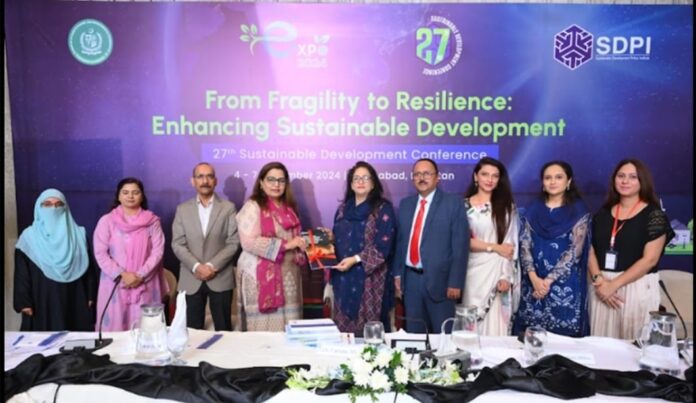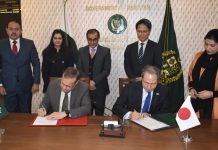By Ali Imran
ISLAMABAD: The experts at a policy dialogue on Minamata Convention Compliance has said rampant use of non-compliant cosmetics in the absence of appropriate legislation, lack of awareness and quality infrastructure are not only raising grave health and environmental concerns, but also bringing embarrassment to the country at the international fora.
This was the gist of a thematic session titled ‘Minamata Convention Compliance in Pakistan: Role of Dermatologists and Regulatory Authorities’ organised by the Sustainable Development Policy Institute (SDPI).
Environmental Investigation Agency in a report at COP-5 on Minamata Convention stated that many skin whitening creams (SWCs) containing mercury more than permissible quantity are sold online and probably originate from Pakistan, the experts said.
They said mercury poisoning referred to toxicity from mercury consumption and the symptoms depended on the type, dose, method and duration of exposure, which include muscle weakness, poor coordination, numbness in the hands and feet, skin rashes, anxiety, memory problems and trouble speaking, hearing and seeing.
Environmental experts, industrialists and policymakers mutually agreed that controlling sources of mercury pollution or emissions and educating the public about its grave impacts could effectively help minimise the toxic chemical’s exposure to human health and environment.
The speakers said in South Asia, skin-whitening creams feed on the region’s obsession with fairness, which mostly stems from our shared histories of invasion and colonisation, and the ongoing global trend of white supremacy.
Moderated by Dr Razia Safdar from the SDPI, the session was chaired by Director Lab/NEQS, Pak EPA, Dr Zaigham Abbas National Focal Point for Minamata Convention; Khawaja Mohiuddin from PSQCA; Brig Dr Naeem Raza president Pakistan Association of Dermatologists, Prof Dr Nadia Ali Zafar, AIMC Lahore; Dr Tahira Shahid, Kaya Wellness Retreat, Islamabad and Dr Sadia Tabassum from AKUH Karachi. Farzana Altaf Director General EPA /MOCC &EC was guest of honour and Dr Shazia Sobia Soomro MNA and former parliamentary secretary Health graced the occasion as chief guest.Pakistan’s cuisine
Dr Razia Safdar said Pakistan was part and signatory of Minamata Convention 2020 since March 2021, which prohibited the manufacture, import and export of cosmetics with mercury concentration over 1PPM.
She said that mercury Initial Assessment report 2019 estimated that cosmetic industry contributed 55 per cent mercury to the environment that needed to be regulated.
Dr Shazia Sobia Soomro extended her strong support to SDPI for compliance to Minamata Convention and elimination of mercury from SWC and advocating this public health interest work at higher political forums like parliamentary standing Committees and electronic and social media for public awareness.
“Every year as much as 9,000 tonnes of mercury were released into the atmosphere, water and land. The largest source of mercury emission is artisanal and small-scale gold mining,” Dr Razia Safdar said, adding that everyone is exposed to some amount of mercury but a high amount can lead to long-term and sometime permanent neurological damages.
Dr Zaigham Abbas said Pakistan had already phased out mercury use from four industries, but now phasing it out from the health sector was also needed.
He said the seriousness of the issue could be gauged from the fact that out of 59 samples of skin whitening creams which were tested, only three were found to be complying with regulations and had mercury lower than 1PPM.
Khawaja Mohiuddin from PSQCA said the country lacked standard labs for testing contaminated cosmetics. He said the PSQCA would have acted if factories were not following rules and would have even sealed them. It was also revealed that there was no legislation to regulate online platform involved in the sale of such cosmetics.Pakistan’s cuisine
Brig Dr Naeem Raza from Pakistan Association of Dermatologists said the use of cosmetics with excessive mercury was rampant, and the reason behind its excessive use was non-implementation of law. He said no concerted efforts were taken in this regard.
Prof Dr Nadia Ali Azfar from AIMC Lahore said online platforms were equally involved and some mechanism needed to be put in place for its control. She also proposed that market practice should be changed.
Dr Tahira Shahid from the Kaya Wellness Retreat said change of attitude was required to overcome this threat.
Director General Environmental Protection Agency Dr Farzana Altaf said that strong legislation was needed in this regard to control the use of mercury in cosmetics as these are resulting in serious health issues like mental growth and stunting.
She said scientific-based research and policy decisions were needed and coordination among institutions and stakeholders should be improved. She also recommended that even 1PPM should not be allowed to control mercury use in cosmetics.






